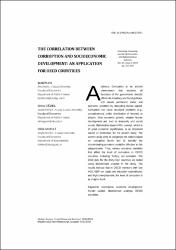| dc.contributor.author | İnam, Betül | |
| dc.contributor.author | Güzel, Simla | |
| dc.contributor.author | Murat, Dilek | |
| dc.date.accessioned | 2022-05-11T14:33:40Z | |
| dc.date.available | 2022-05-11T14:33:40Z | |
| dc.date.issued | 2019 | |
| dc.identifier.issn | 1301-8752 | |
| dc.identifier.issn | 1309-6338 | |
| dc.identifier.uri | https://doi.org/10.17065/huniibf.373711 | |
| dc.identifier.uri | https://app.trdizin.gov.tr/makale/TXpJeU5qTXlNZz09 | |
| dc.identifier.uri | https://hdl.handle.net/20.500.11776/7859 | |
| dc.description.abstract | Corruption is an ancient phenomenon that weakens all functions of the government, directly affects its monetary and fiscal policies, and causes permanent social and economic problems by disrupting human capital. Corruption can cause structural problems (e.g., unemployment, unfair distribution of income) to deepen, slow economic growth, weaken human development and lead to insecurity and social unrest. Statistical analysis of this concept, which is of great economic significance, is an important source of motivation for the present study. The current study aims to categorize the nations based on corruption levels and to identify the discriminating economic variables effective in this categorization. Thus, various economic variables that affect the level of corruption in OECD countries, including Turkey, are evaluated. The 2013 data for the thirty-four countries are tested using discriminant analysis in the study. The results indicate that in OECD members with low HDI, GDP per capita and education expenditures, and high unemployment, the level of corruption is at a higher level. | en_US |
| dc.description.abstract | Yolsuzluk, devletin tüm işlevlerini zayıflatan, para ve maliye politikalarını doğrudan etkileyen ve beşeri sermayeye zarar vererek kalıcı sosyal ve ekonomik problemlere yol açan eski bir olgudur. Yolsuzluk, ülkelerde var olan yapısal problemlerin (işsizlik, adaletsiz gelir dağılımı gibi) derinleşmesine, ekonomik gelişmenin yavaşlamasına neden olabilmekte, insani gelişmeyi zayıflatarak, güvensizlik ortamı ve toplumsal huzursuzluklara yol açmaktadır. Bu çalışmada ülkelerin yolsuzluk düzeylerine göre gruplandırılması ve bu gruplandırmada etkili olan ayırt edici ekonomik değişkenlerin tespit edilmesi amaçlanmıştır. Bu bağlamda ülkemizin de üyesi olduğu OECD ülkeleri için yolsuzluk düzeyini etkileyen çeşitli ekonomik değişkenler değerlendirilmiştir. Araştırma kapsamında otuz dört ülkeye ilişkin derlenen 2013 yılı verileri diskriminant analizi kullanılarak test edilmiştir. Sonuçlar, İnsani Gelişme Endeksi, kişi başı gelir, eğitim harcamaları gibi değişkenlerin düşük, işsizlik oranının yüksek olduğu OECD ülkelerinde yolsuzluk düzeyinin daha yüksek olduğunu göstermektedir. | en_US |
| dc.language.iso | eng | en_US |
| dc.identifier.doi | 10.17065/huniibf.373711 | |
| dc.rights | info:eu-repo/semantics/openAccess | en_US |
| dc.subject | İktisat | en_US |
| dc.subject | İşletme | en_US |
| dc.title | The Correlation Between Corruption and Socioeconomic Development: An Application for Oecd Countries | en_US |
| dc.title.alternative | Yolsuzluk ve Sosyo Ekonomik Gelişme İlişkisi: Oecd Ülkeleri İçin Bir Uygulama | en_US |
| dc.type | article | en_US |
| dc.relation.ispartof | Hacettepe Üniversitesi İktisadi ve İdari Bilimler Fakültesi Dergisi | en_US |
| dc.department | Fakülteler, İktisadi ve İdari Bilimler Fakültesi, Maliye Bölümü | en_US |
| dc.identifier.volume | 37 | en_US |
| dc.identifier.issue | 2 | en_US |
| dc.identifier.startpage | 325 | en_US |
| dc.identifier.endpage | 339 | en_US |
| dc.institutionauthor | Güzel, Simla | |
| dc.identifier.trdizinid | TXpJeU5qTXlNZz09 | en_US |



















